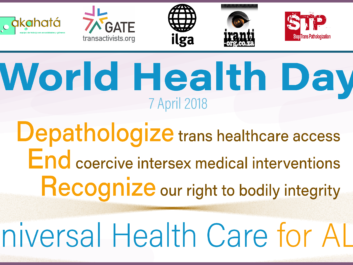Joint Statement: World Health Day 2018

According to WHO, 50% of the world lacks access to essential health services and 100 million people globally are pushed into poverty trying to cover healthcare costs. Today, on World Health Day, we call upon world leaders to commit to advancing health for all by moving towards Universal Health Coverage (UHC), as pledged in the Sustainable Development Goals (SDG) 2030 Agenda. This will ensure that everyone, everywhere can access quality health services without facing financial hardship.
The term ‘universal’ in ‘Universal Health Coverage’ means “for all”, without discrimination, yet trans, gender diverse and intersex people, among others globally, face social and institutionalized discrimination daily. This discrimination affects all areas of life. It includes social stigma – which can lead to bullying, harassment and violence – and restricts access to healthcare, housing, education and employment. Structural and systemic discrimination has an increased impact upon people of color, indigenous communities, sex workers, drug users, migrants, those in prison, homeless individuals and/or those living in extreme poverty, and D/deaf, disabled and neuro-diverse individuals. For example, sex work is criminalized in many regions of the world, resulting in a higher likelihood of experiencing violence, poverty and refusal of healthcare access. People of color, indigenous communities and migrants face additional oppression due to racism, colonialism and the normalization of whiteness in Western societies.
This systemic neglect and intersectional discrimination results in high levels of poverty within, among others, the global trans, gender diverse and intersex communities. Trans and gender diverse individuals face widespread violence and lack of access to basic healthcare. When combined with the increasing rates of HIV infection in trans communities due to lack of primary prevention, this places them at a significant disadvantage when compared to the rest of the population. Furthermore, access to trans-specific healthcare is currently pathologized in most parts of the world, burdening trans individuals with ‘proving’ their gender prior to gaining access to transition-related healthcare. Intersex individuals face persistent human rights violations perpetrated against them in medical settings, which often aggravates ongoing health conditions while consequentially making access to further healthcare challenging or impossible.
In order to ensure that Universal Health Coverage is achieved, all communities must be included in providing health for all. Involving trans, gender diverse and intersex communities in the design, development and practice of improving healthcare access is fundamental to promoting real change. This must be combined with the implementation of laws and policies that target systemic and institutionalized discrimination against these communities. For instance, transition-related healthcare must be depathologized so that being trans is no longer treated as a mental illness and trans people are free to make their own decisions about the healthcare that is right for them. It is also essential to end forced and coercive medical interventions on people with intersex variations in all stages of life and to recognize their right to bodily integrity and self-determination.
A commitment to Universal Health Coverage is a commitment to promoting inclusion and equality and ending human rights violations against trans, gender diverse and intersex people.
In solidarity,
Akahatá – Equipo de trabajo en Sexualidades y Géneros
Asia Pacific Transgender Network (APTN)
STP, International Campaign Stop Trans Pathologization
TGEU
Follow the conversation on twitter: #WorldHealthDay #HealthForAll